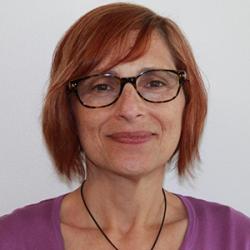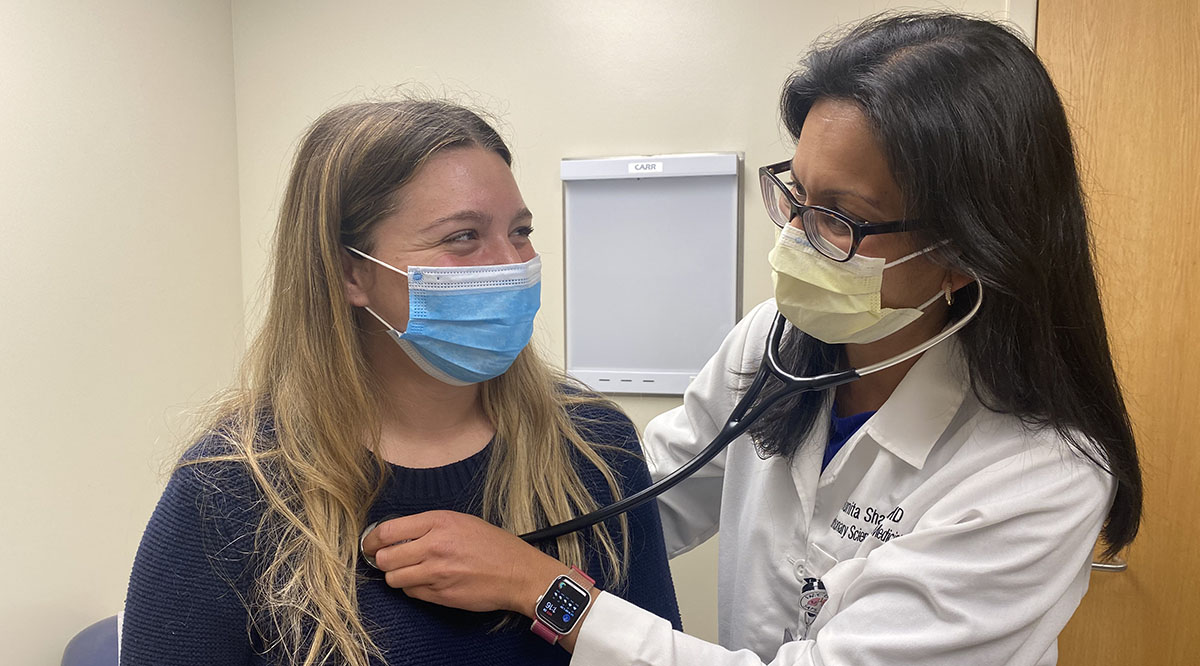
For Sunita Sharma, MD, COVID-19 started out simple. In September, a week after working in an intensive care unit, the pulmonologist developed muscle aches and a low-grade fever for a couple of days.
But tougher symptoms soon hit. Sharma, who works at UCHealth in Aurora, Colorado, developed sweats that drenched her sheets and a cough so bad she could barely talk. About two weeks in, her blood oxygen levels plummeted, hospitalizing her for five terrifying days. And when she went home, she needed supplemental oxygen for a month.
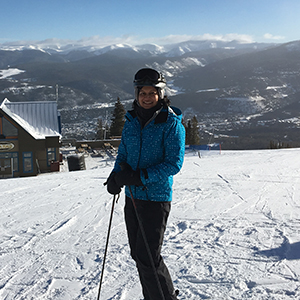
Sharma has been working hard since then to rebuild her strength. "I used to love skiing, and I could run 5 miles consistently. But now I'm probably about 50% of where I was,” she explains. And she wonders whether she’ll ever return to normal.
“I hope I’ll get back to where I was. I hope I will, but I have absolutely no idea how long it will take,” she says.
No one knows exactly how many physicians are among those who have been dubbed long-haulers — the roughly one-third of COVID-19 patients who wind up with long-term symptoms. Before vaccines rolled out, though, front-line health care workers faced three times the risk of contracting the coronavirus compared to the broader community, according to a paper published in the Lancet in September.
The increased risk is fueled by several factors, including constant exposure to the virus in hospitals and a scarcity of personal protective equipment (PPE), particularly early in the pandemic.
Concerned about colleagues struggling from long COVID-19, eight Massachusetts General Hospital doctors recently published a Lancet piece urging institutions to support affected providers. Doing so is not only essential to keep hospitals running, they wrote, but also “a moral obligation to those who have sacrificed their health.”
Below are four stories of providers — all of whom were previously healthy — whose lives were upended by long COVID-19. They shared their experiences in the hopes of conveying that the phenomenon is real — and can be crushing.
“It’s so important to ensure that people believe patients like me,” urged one doctor. “Even if we look completely fine on the outside, something still can be very, very wrong.”
A focus on family
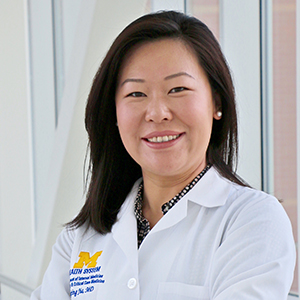
When Shijing Jia, MD, caught COVID-19 last April, she was so short of breath that she could barely utter more than one word at a time. Soon, muscle weakness made it impossible for her to hold a cup, and arthritis meant she couldn’t type for nearly two months. Her liver enzymes and kidney function numbers leapt up repeatedly throughout the spring and fall.
Jia, a pulmonary and critical care specialist at Michigan Medicine in Ann Arbor, says various symptoms have persisted throughout this past year. Although COVID-19 vaccination seems to help some long-haulers, that wasn’t the case for Jia. However, she did benefit from an injection medication for lung disease — a treatment she started after being unable to wean off steroids for four months.
Jia’s pulmonary problems are not unusual since the coronavirus often attacks a person’s lungs. But long COVID-19 — often defined as symptoms lasting beyond four weeks — can manifest in more than a dozen disturbing ways. It also can linger for months, even among people who initially had milder COVID-19 cases. Major research efforts are underway to explore the mechanisms of long-term COVID, which in February got a scientific moniker: post-acute sequelae of SARS-CoV-2 infection.
Like many other affected physicians, Jia was terribly frustrated by her trouble working. “I wanted so badly to help my colleagues, yet I couldn’t walk for weeks and climb stairs for months,” she explains. “At one point, I considered going on rounds in a wheelchair, but I would have just slowed the team down.”
Her career has certainly taken a hit, says Jia, who studies lung disease. “I was unable to work for weeks, and I worked part-time for many more. I’d planned to submit a huge grant this year, but that didn’t happen, so my academic career has been derailed.”
But long COVID-19 has also offered Jia some valuable lessons.
“I’m in a field where you see a lot of death, but somehow, until you’re the one who’s sick, it doesn’t really hit you that you need to set your priorities straight,” she notes. “I realized I should stop putting off starting a family." Jia and her partner of six years decided not to wait any longer to get married — and did so in August, outdoors with just three guests.
Jia says her illness deepened her appreciation of her husband. A software engineer, he was working from home and spent significant time caring for her. “Seeing me so sick was incredibly hard for him,” she says. “The only time I start to cry about this entire experience is when I think about how much he loves me.”
Surviving — and studying — a strange disease
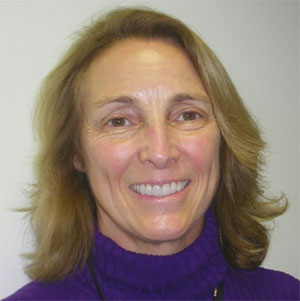
On March 6 last year, Coleen Kivlahan, MD, attended a daylong meeting where San Francisco’s UCSF Health leaders tackled some highly intense questions: If COVID-19 struck the area hard, how would they test patients, manage the emergency department, build triage tents, and bring in the necessary PPE?
A few hours later, Kivlahan, then UCSF Health's executive medical director of primary care, was slapped by chills and a racking cough. “That was the beginning,” she says.
Kivlahan isn’t sure which patient led to her infection, but like many other UCSF physicians who responded to a recent survey, she’s confident she contracted COVID-19 at work. “A few days prior, I spent 40 minutes with a patient with that same cough and chills,” notes Kivlahan, a professor of family and community medicine at the University of California, San Francisco, School of Medicine. “It was the early days of COVID, and I had a surgical mask but no other PPE.”
In April, a dramatic drop in blood pressure and oxygen levels sent Kivlahan to the triage tent. Her co-workers recommended she consider hospital admission, but she refused. “Back then, there was only one outcome for admission — being on a ventilator. I knew I didn’t want that.”
Kivlahan tested positive for COVID-19 over the next 100 days, and she suffered for months with symptoms like an intense pressure in her chest. Still, she continued to work, sometimes seeing patients via video and attending meetings from her bed when necessary.
“[Being part of a teaching hospital] has imbued in me the spirit of recovery, the spirit of curiosity, and the spirit of humility in the face of what we just don’t know.”
Coleen Kivlahan, MD
Primary care specialist at UCSF Health
Even now, Kivlahan has not gotten back her sense of taste or smell. For a while, she smelled fires that simply weren’t there.
“I know that some of the symptoms sound bizarre,” she says. “But there’s such a large number of people who’ve experienced this, and the science has gotten much better at explaining why it happens.”
She notes that academic medicine is dedicated to unraveling such mysteries, and she herself has begun researching the impact of COVID-19 on health professionals. “I’m so grateful to be part of a teaching hospital,” Kivlahan says. “It has imbued in me the spirit of recovery, the spirit of curiosity, and the spirit of humility in the face of what we just don’t know.”
Incredible colleagues
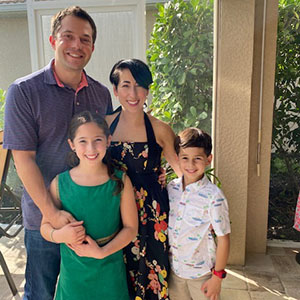
This past summer, Jeffrey Siegelman, MD, spent 40 days isolating in his basement, driven there by a low-grade fever and the fear of spreading COVID-19. During that time, he saw his children only via video and his wife from the bottom of a staircase.
Siegelman first suspected he’d contracted the coronavirus when — after an emergency department shift packed with COVID-19 patients at Grady Memorial Hospital in Atlanta — he woke on Aug. 3 with a headache and fever. When he couldn’t taste his breakfast the next morning, he felt convinced. “I was having blueberry yogurt. It was just the strangest thing,” he says. “I could feel it, but I couldn’t taste it.”
Over the next few weeks, Siegelman would develop additional symptoms, including muscle aches and heart palpitations, but the ones that kept him sidelined for six months were fatigue and brain fog, which he describes as a fullness in his head. “It’s kind of like a vise that impairs my ability to concentrate.”
Ongoing treatment, including blood pressure medication, now enables Siegelman to work for four hours — rather than his usual eight — before dizziness or exhaustion sets in.
That means his colleagues have had to pick up scores of shifts. “This started in the middle of a pandemic, when emergency physicians in particular were worn so thin. There’s no question that I’ve dealt with a lot of guilt about adding to my colleagues’ stress.”
Siegelman is enormously grateful to his co-workers, who never questioned his condition — even though he’d tested negative for COVID-19. He says his providers think his test results were faulty, possibly due to timing or sample collection problems.
He also appreciates how validating his COVID-19-related providers have been. “That’s really a luxury among people with chronic illness. There’s definitely some stigma in medicine around patients with disease that’s not verified by a test or examination.”
Like many other physicians with long COVID-19, Siegelman says he hopes the experience has made him a better provider.
“I’m much more sensitive now. Especially in emergency medicine, we do a test, and when it’s normal we say, ‘OK, you can go home.’ But that person is still suffering,” he says. “That’s really what’s important — focusing on what they’re experiencing and getting them on a plan to recovery.”
Too stubborn to give up
In the middle of March last year, Susan Poll* had just a tickle in her throat. The next day, though, she was hit with diarrhea and chills. Soon, pneumonia, incessant coughing, heart racing, and shortness of breath kicked in.
Poll, a critical care physician at a Midwestern teaching hospital, quickly suspected COVID-19 based on her symptoms even though there were few cases in her area, and she ultimately tested positive.
Poll’s toughest symptoms lasted around two weeks, so she only missed a few days of work. In just a month, she was delighted to be fully recovered.
But then, new symptoms struck — and only worsened over the next six months. Poll developed brain fog, headaches, trouble sleeping, and a near-crushing exhaustion.
“I basically sat on the couch for a whole week in November,” she says. “I wanted to get up for a glass of water but couldn’t do it.”
Now, almost a year later, Poll is somewhat better, in part thanks to a migraine medication. Yet the fatigue won’t let go. “I just feel lousy. I feel like I’m in a different body from the one I’ve known my entire life.”
She manages by taking frequent breaks — and eliminating almost everything in her life other than work. It’s tough for her just to run simple errands, and once beloved activities like hiking, traveling, or gardening are out of the question. Although she feels able to care for her patients, she doesn't want to worry them, which is why she prefers to remain anonymous.
Still, Poll feels lucky compared to others with long-haul issues.
“As a physician, I’m in a position of privilege.” For one, she says, “I was able to come to the conclusion that my experience was all related to COVID.” Then, she was able to quickly search the internet and located a COVID-19 clinic at Northwestern Memorial Hospital in Chicago. “I have the means to find these people and go to these appointments and pay for treatments. I was at a huge advantage.”
Poll’s providers — and her own tenacity — keep her going when she starts to feel hopeless.
“A big thing for me was accepting that I need to learn how to live with this, rather than fighting it. I need to adjust my life around it since it isn’t going away anytime soon, and it may never be going away,” she explains. “But I’m pretty stubborn, so I’m very oriented toward doing everything I can to recover eventually.”
*Not her real name
